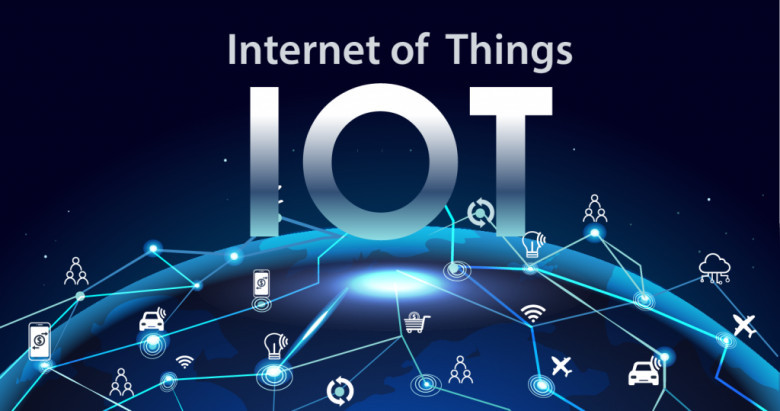views

In a world where digital connectivity shapes our everyday experiences, the Internet of Things (IoT) stands at the forefront of technological revolution. From smart homes to automated industries, IoT is seamlessly connecting devices, systems, and services to enhance productivity, convenience, and safety. In this blog, we will explore what IoT is, how it works, its applications, benefits, challenges, and the growing importance of companies like Hexadecimal Software and HexaHome in driving IoT innovation in India.
📡 What is the Internet of Things (IoT)?
The Internet of Things refers to a network of physical devices embedded with sensors, software, and other technologies that connect and exchange data with other devices and systems over the internet. These devices—commonly known as “smart” devices—include everything from thermostats and light bulbs to industrial robots and connected vehicles.
The main goal of IoT is to extend internet connectivity beyond traditional devices like computers and smartphones to a diverse range of everyday objects, enabling them to collect, communicate, and act on data without human intervention.
⚙️ How IoT Works: The Core Components
IoT systems consist of four major components:
-
Sensors/Devices: These collect real-time data from the environment or a physical object. For example, a smart AC might detect temperature and humidity levels.
-
Connectivity: Devices transmit collected data to the cloud or another device using Wi-Fi, Bluetooth, cellular, or other network options.
-
Data Processing: Cloud platforms or local systems analyze the data to make decisions. For instance, a smart home system may decide to turn off lights if no motion is detected.
-
User Interface: Users can interact with the system through dashboards or mobile apps to monitor or control devices remotely.
🏠 Real-World Applications of IoT
IoT is no longer a concept of the future—it is already integrated into our daily lives across various sectors:
1. Smart Homes
IoT-enabled homes offer comfort, security, and energy efficiency. Smart thermostats, lighting systems, home assistants, and security cameras provide automation and remote control.
2. Healthcare
Wearable devices track heart rate, sleep patterns, and other vital signs, sending data to doctors in real time. IoT improves diagnostics, medication management, and emergency response.
3. Agriculture
Smart sensors monitor soil moisture, temperature, and weather to optimize irrigation and crop health, boosting yields and reducing water usage.
4. Industrial Automation (IIoT)
Factories use connected machines to track equipment health, predict failures, and improve operational efficiency.
5. Transportation and Logistics
IoT helps track vehicle locations, optimize delivery routes, and monitor fuel usage, making logistics more transparent and efficient.
6. Smart Cities
IoT powers traffic control, waste management, smart lighting, and public safety systems in cities, enhancing urban living.
💡 Benefits of IoT
-
Automation and Control: Devices operate with minimal human involvement, saving time and effort.
-
Improved Efficiency: Real-time monitoring leads to better resource utilization and lower operational costs.
-
Data-Driven Insights: Organizations can make informed decisions based on accurate data analytics.
-
Enhanced Safety: Sensors can detect gas leaks, fire hazards, or unauthorized entries and alert users instantly.
-
Convenience: Smart devices make everyday tasks easier—from setting alarms to managing groceries.
🛡️ Challenges in IoT Adoption
While the benefits are immense, IoT implementation comes with its set of challenges:
-
Security Risks: IoT devices are potential targets for cyberattacks. Without proper security protocols, sensitive data can be compromised.
-
Privacy Concerns: Continuous data collection raises concerns about surveillance and data misuse.
-
Complex Integration: Connecting multiple devices across platforms and protocols requires standardization.
-
High Initial Cost: IoT systems require investments in devices, infrastructure, and training.
-
Data Overload: Managing and processing large volumes of data can be overwhelming without robust systems.
🔍 IoT in India: Growing Adoption and Innovation
India is rapidly embracing IoT technology across both urban and rural areas. Sectors like agriculture, healthcare, energy, and manufacturing are leveraging IoT to solve local challenges. The Government of India’s push toward Smart Cities and Digital India is further accelerating adoption.
Companies like Hexadecimal Software are playing a critical role in building end-to-end IoT solutions tailored for Indian enterprises. With expertise in software development, cloud integration, and automation, they are empowering businesses to harness IoT’s full potential.
🏡 Smart Living with HexaHome
On the consumer front, brands like HexaHome are transforming everyday living with smart home automation systems. Whether it’s controlling appliances, securing your property, or managing energy usage remotely, HexaHome products bring intelligence into Indian households. They offer customizable solutions with user-friendly interfaces that bridge the gap between innovation and comfort.
🔮 The Future of IoT
The future of IoT looks promising with trends such as:
-
AI-Powered IoT: Integrating Artificial Intelligence to enable predictive analytics and automated decision-making.
-
5G Connectivity: Ultra-fast, low-latency networks will improve real-time communication between devices.
-
Edge Computing: Moving data processing closer to the source (edge devices) to reduce latency and improve performance.
-
IoT in Sustainability: Smart grids, water management, and waste monitoring will aid environmental conservation.
📌 Conclusion
The Internet of Things is not just a technological trend—it’s a revolution that is transforming how we live, work, and interact with our environment. With its widespread applications and exponential growth, IoT is set to redefine industries and lifestyles. However, to fully realize its potential, it’s crucial to address security, privacy, and scalability challenges.
Indian companies like Hexadecimal Software and HexaHome are leading the way by providing robust and innovative solutions that align with local needs and global standards. As IoT continues to evolve, it will unlock new possibilities for smarter, safer, and more sustainable living.



Comments
0 comment